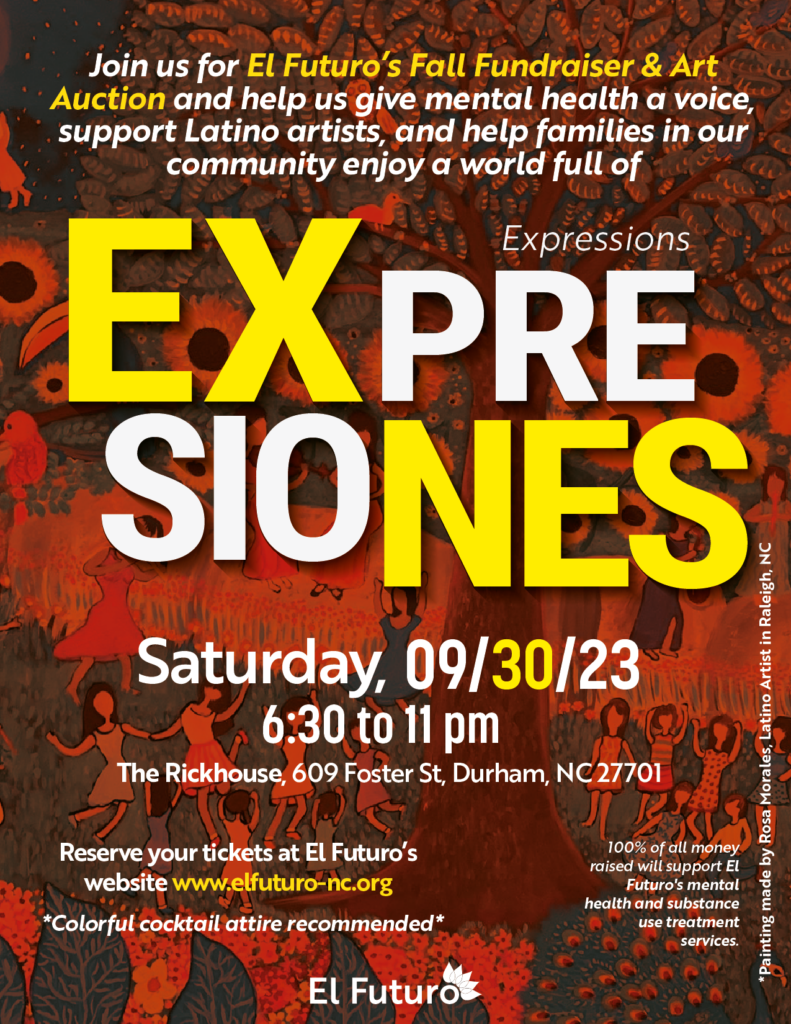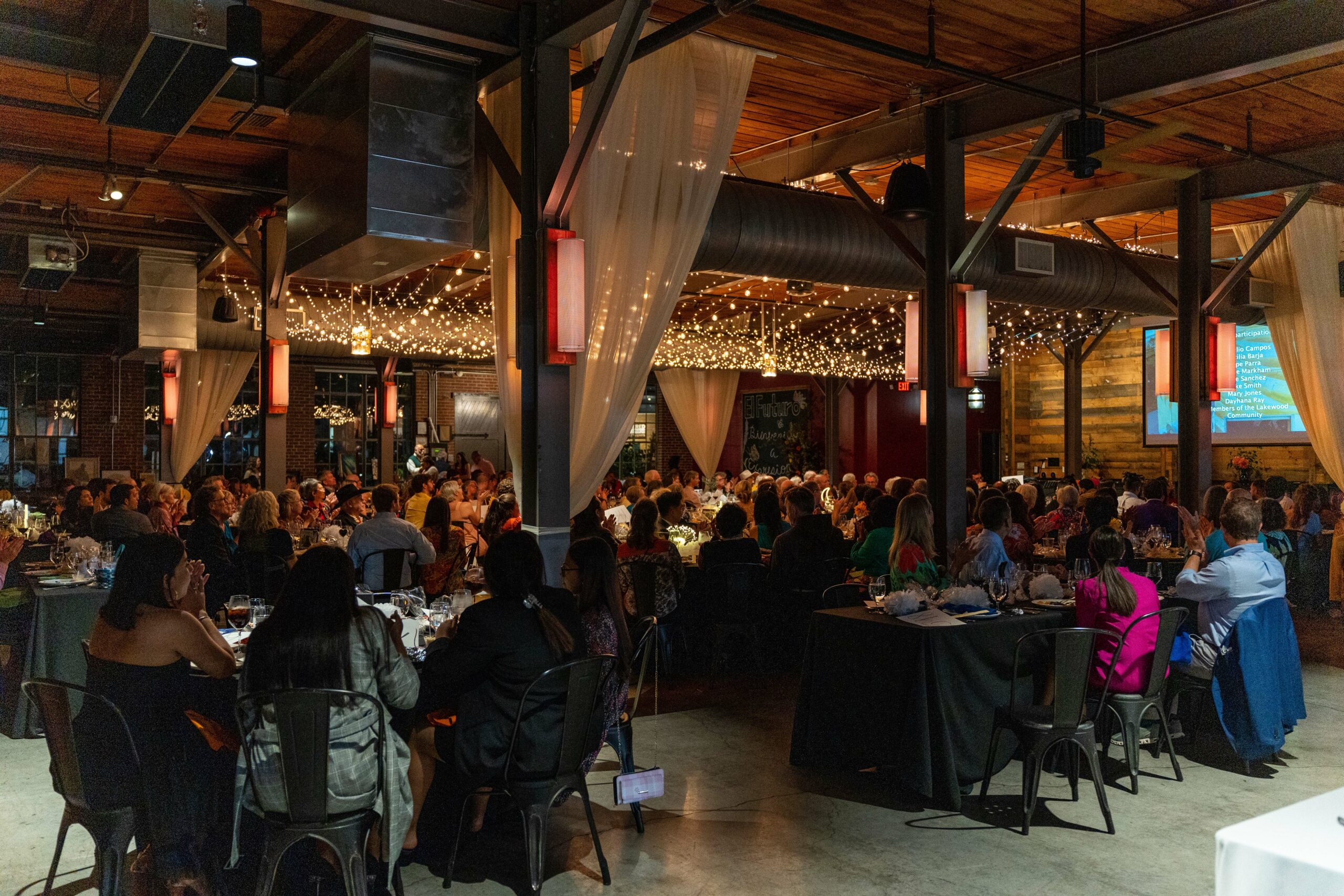 El Futuro’s Annual Fall Fundraiser and Art Auction “Expresiones”, is scheduled for September 30th from 6:30-11 p.m. at The Rickhouse in downtown Durham. This annual event unites local Latino businesses, artists, and community members in a cultural celebration to raise funds and resources that help El Futuro continue to provide culturally effective mental health services to our Latino community to nurture stronger familias.
El Futuro’s Annual Fall Fundraiser and Art Auction “Expresiones”, is scheduled for September 30th from 6:30-11 p.m. at The Rickhouse in downtown Durham. This annual event unites local Latino businesses, artists, and community members in a cultural celebration to raise funds and resources that help El Futuro continue to provide culturally effective mental health services to our Latino community to nurture stronger familias.
There will be a live and silent auction featuring local Latino artists, Mexican-American cuisine from Azteca Grill and music from Luna Nightclub. We invite donors and organizations that support our work, to join us for a night of fun, expression, and live music. The theme of the event will bring together the colorful national birds and flowers of Latin America, as well as our logo of colorful sunflower petals that embodies the diverse Latin American cultures that come together with hope and happiness.
This is El Futuro’s third year hosting Expresiones and 19th year of service to the community and this year El Futuro celebrates all the funders, donors, and supporters who have helped grow the mental health services in our Latino community. El Futuro is closing the gaps of disparities between the Latino culture and mental health services by breaking down barriers to care and offering culturally competent services such as; a therapeutic garden, family-centric care, late work hours to accommodate farm workers, bilingual and bicultural staff, and traditional festivities such as the Kermes festival that provides a space to celebrate the Latino culture.
Studies have shown that culturally competent care offers better results. According to Nielsen-Bohlman et al., “Cultural beliefs affect how people think and feel about their health and health problems, when and from whom they seek health care, and how they respond to recommendations for lifestyle change, health-care interventions, and treatment adherence.” The National Alliance on Mental Illness states that the Latino population experiences many barriers to accessing mental health care; some include; poverty, lack of insurance, legal status, stigma, and lack of cultural competence. These barriers prevent Latinos from accessing mental health services and receiving treatment. You can see why El Futuro has had so much success in delivering culturally effective care, and the Latino community is more willing and able to receive treatment from El Futuro. Quoting Dr. Luke Smith, the Executive Director at El Futuro, “Each person deserves access to restorative mental health services regardless of their background or ability to pay.”
El Futuro has created a safe, culturally acceptable environment where the Latino community can express themselves, thus achieving better mental health for their families and communities. Reconnecting to one’s heritage, traditions, and cultural values brings a sense of safety, belonging, and resiliency, allowing one to flourish and thrive. With improved mental health, Latinos are encouraged to dream bigger, reach higher, and accomplish their goals for better jobs, education, health, and roles in our society. The entire community benefits from helping the Latino population because the result is a prosperous community.
Article written by Candy Moreira BSN RN
* Institute of Medicine (US) Committee on Health Literacy, Nielsen-Bohlman, L., Panzer, A. M., & Kindig, D. A. (Eds.). (2004). Health Literacy: A Prescription to End Confusion. National Academies Press (US).


 Alvely Alcántara, LCSW
Alvely Alcántara, LCSW Rossy C. Garcia, MEd
Rossy C. Garcia, MEd  Katy Sims, MD
Katy Sims, MD  Everardo Aviles, LCSW, LCAS (Eve)
Everardo Aviles, LCSW, LCAS (Eve) As a medical anthropologist and social work researcher, Dr. Gulbas’ research embodies interdisciplinarity through the integration of applied theories of health and human development with qualitative and ethnographic methodologies. Her work seeks to understand how people—children, families, and providers—navigate complex sociocultural landscapes in the pursuit of mental health. Most of her work, to date, focuses attention on developing more robust interpretations of suicide risk. With funding from the National Institutes of Mental Health, this body of research has contributed to advancements in theoretical and empirical knowledge of the broader contexts within which youth suicide risk is situated.
As a medical anthropologist and social work researcher, Dr. Gulbas’ research embodies interdisciplinarity through the integration of applied theories of health and human development with qualitative and ethnographic methodologies. Her work seeks to understand how people—children, families, and providers—navigate complex sociocultural landscapes in the pursuit of mental health. Most of her work, to date, focuses attention on developing more robust interpretations of suicide risk. With funding from the National Institutes of Mental Health, this body of research has contributed to advancements in theoretical and empirical knowledge of the broader contexts within which youth suicide risk is situated.  R. Gabriela Barajas-Gonzalez is a developmental psychologist and an assistant professor of Population Health at NYU Grossman School of Medicine. Dr. Barajas-Gonzalez is the principal investigator of a study that examines the impact of immigration-related threat and stress on school communities. She earned a PhD in developmental psychology from Columbia University and hold a BA in human biology from Stanford University. Dr. Barajas-Gonzalez is the daughter of Mexican immigrants and a first gen college student.
R. Gabriela Barajas-Gonzalez is a developmental psychologist and an assistant professor of Population Health at NYU Grossman School of Medicine. Dr. Barajas-Gonzalez is the principal investigator of a study that examines the impact of immigration-related threat and stress on school communities. She earned a PhD in developmental psychology from Columbia University and hold a BA in human biology from Stanford University. Dr. Barajas-Gonzalez is the daughter of Mexican immigrants and a first gen college student. Dr. Parra-Cardona is an Associate Professor in the Steve Hicks School of Social Work (SHSSW) at the University of Texas at Austin. At the SHSSW, he serves as Coordinator for Mexico and Latin American initiatives. He also serves as Area Director for Research at the UT Austin Latino Research Institute. Dr. Parra-Cardona’s program of research is focused on the cultural adaptation of evidence-based parenting interventions for low-income Latinx populations in the US and Latin America.
Dr. Parra-Cardona is an Associate Professor in the Steve Hicks School of Social Work (SHSSW) at the University of Texas at Austin. At the SHSSW, he serves as Coordinator for Mexico and Latin American initiatives. He also serves as Area Director for Research at the UT Austin Latino Research Institute. Dr. Parra-Cardona’s program of research is focused on the cultural adaptation of evidence-based parenting interventions for low-income Latinx populations in the US and Latin America. Bianka Reese, PhD, MSPH is a research scientist and program evaluator specializing in adolescent and young adult sexual and reproductive health. Her previous research in the experiences of Latinx LGBTQ+ youth stems from her work as the Research and Evaluation Manager at SHIFT NC (Sexual Initiatives For Teens), where she led largescale evaluations of multilevel, community-based sexual health promotion initiatives and research projects aimed at elevating the voices of diverse youth in North Carolina. Dr. Reese is currently the Senior Research Strategist at Creative Research Solutions, LLC, an award-winning national evaluation, research, and assessment firm.
Bianka Reese, PhD, MSPH is a research scientist and program evaluator specializing in adolescent and young adult sexual and reproductive health. Her previous research in the experiences of Latinx LGBTQ+ youth stems from her work as the Research and Evaluation Manager at SHIFT NC (Sexual Initiatives For Teens), where she led largescale evaluations of multilevel, community-based sexual health promotion initiatives and research projects aimed at elevating the voices of diverse youth in North Carolina. Dr. Reese is currently the Senior Research Strategist at Creative Research Solutions, LLC, an award-winning national evaluation, research, and assessment firm. Tania Connaughton-Espino, MPH is an independent researcher focused on adolescent and young adult sexual and reproductive health. Her interest in the experiences of Latinx LGBTQ+ youth stems from her previous work with SHIFT NC (Sexual Initiatives For Teens), where she led the training and evaluation department, conducted capacity-building workshops for youth serving professionals including on the topic of how to be more affirming of LGBTQ youth, and from her extensive experience working with the Latinx population in NC.
Tania Connaughton-Espino, MPH is an independent researcher focused on adolescent and young adult sexual and reproductive health. Her interest in the experiences of Latinx LGBTQ+ youth stems from her previous work with SHIFT NC (Sexual Initiatives For Teens), where she led the training and evaluation department, conducted capacity-building workshops for youth serving professionals including on the topic of how to be more affirming of LGBTQ youth, and from her extensive experience working with the Latinx population in NC. Maru Gonzalez, EdD is an Assistant Professor and Youth Development Specialist in the Department of Agricultural and Human Sciences at North Carolina State University. Her areas of inquiry include youth development with a focus on activism, social justice, and the experiences of LGBTQ+ young people across familial, school, and community contexts.
Maru Gonzalez, EdD is an Assistant Professor and Youth Development Specialist in the Department of Agricultural and Human Sciences at North Carolina State University. Her areas of inquiry include youth development with a focus on activism, social justice, and the experiences of LGBTQ+ young people across familial, school, and community contexts.  Nayeli Y. Chavez-Dueñas, PhD
Nayeli Y. Chavez-Dueñas, PhD Hector Y. Adames, PsyD
Hector Y. Adames, PsyD